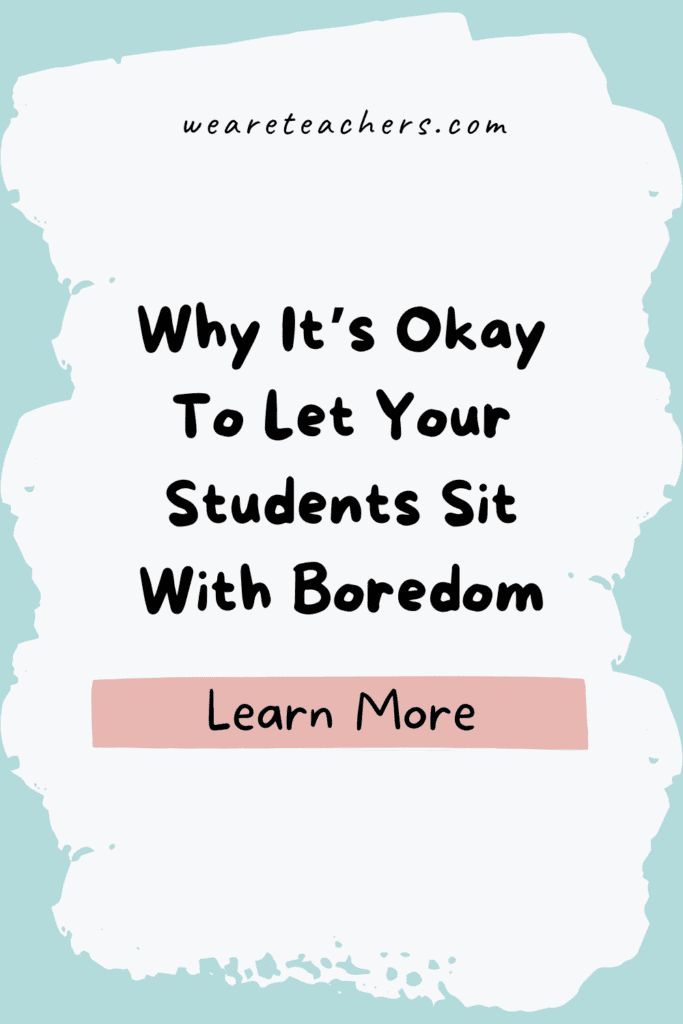Anyone who spends ANY time with children has heard it over and over again:
“But I’m soooooooooooo bored. What can I doooooooo?”
It’s easy to let this whining press our buttons and offer up solutions to keep students busy. But … the next time you hear this complaint, consider inviting boredom into your classroom.
Why is boredom good for students?
Today, kids lead highly structured lives. Children have little time to just “do nothing” since their days are filled with extracurricular activities, toys and games at hands’ reach, and technology as an easy option for entertainment. As a result, they have fewer opportunities to “be alone” with “nothing to do.” And, when they are in that situation, they run to adults to figure out what to do!
And, as adults, we are programmed to jump in and respond to our children. However, by doing so, we are robbing them of so many great opportunities.

The benefits of boredom
When kids are bored, it means they have to find ways to entertain THEMSELVES. They must rely on their own imagination and creativity to create something to do.
Yes, it means you will hear whining. Yes, whining isn’t fun to listen to. The first step is to mentally accept the fact that it is OK for our kids to be bored. Check out this great article by Let Grow to learn more about boredom tolerance!
So, why tolerate the whining? Here are 5 reasons to encourage our kids to be bored:
1. Boredom enhances problem-solving skills
Far too often, we jump in to solve our kids’ problems as well. If left alone, students will be forced to find solutions.
For example:
Student #1: I know, let’s play grocery store! (Problem Solving #1)
Student #2: Great idea! What should we use? (Problem Solving #2)
Student #1: We can use these books and pencils, but what can we use for money? (Problem Solving #3)
Honestly, the whole process will be filled with problems, solutions, experimenting, failing, etc. Now THAT’S a great lesson!
2. Boredom leads to self discovery
When a child is faced with nothing to do, they begin to ask, “What am I drawn to right now? Building? Reading? Drawing? Art?”
3. Boredom allows students to become present
Without a screen in front of them, kids have the opportunity to discover and notice things around them that normally get taken for granted.
For example:
Student: Hmmm, I see an empty box over there. I bet I could turn it upside down and turn it into a table. Maybe I’ll set up a restaurant with it!
4. Boredom fosters independence
Kids need time to be in charge and responsible for their own time. While structured activities are excellent, students also need time to be the decision makers in how they will spend their time.
5. Boredom teaches conversational skills
When children are bored together, they will discuss, share ideas, listen, and compromise.
Example:
Student #1: “Hey, do you want to build a fort together?”
Student #2: “Nah. Let’s create an obstacle course…”
Student #1: “OK. Could we think of a way to make a fort on our obstacle course?”
Disclaimer:
Is it good for kids to be bored ALL the time? No.
As with everything, we need to find the right balance. Kids definitely benefit from a structured day.
Will they complain when they ARE bored? At first, yes. It won’t happen instantly; they will need time to get there but don’t give in! Set a timer if you need to for “time you will spend being bored.” Kids (and adults!) will be surprised at just how creative they can truly be …
Looking for more info? Check out this article from the Child Mind Institute to learn more about the benefits of boredom.
Click here to read more about helping our kids get off their devices and be more creative at home and at school!
Do you agree with these benefits of boredom in the classroom? Share in the comments below!


